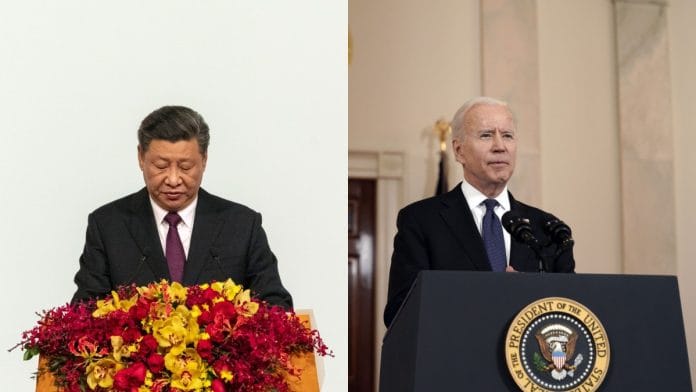Washington: The U.S. is entering a period of intense competition with China as the government running the world’s second-biggest economy becomes ever more tightly controlled by President Xi Jinping, the White House’s top official for Asia said Wednesday.
“The period that was broadly described as engagement has come to an end,” Kurt Campbell, the U.S. coordinator for Indo-Pacific affairs on the National Security Council, said at an event hosted by Stanford University. U.S. policy toward China will now operate under a “new set of strategic parameters,” Campbell said, adding that “the dominant paradigm is going to be competition.”
Chinese policies under Xi are in large part responsible for the shift in U.S. policy, Campbell said, citing military clashes on China’s border with India, an “economic campaign” against Australia and the rise of China’s “wolf warrior” diplomacy. Beijing’s behavior was emblematic of a shift toward “harsh power, or hard power” which “signals that China is determined to play a more assertive role,” he said.
The blunt comments by Campbell came as President Joe Biden said he ordered the U.S. intelligence community to “redouble” its efforts to determine where the Covid-19 virus came from, after conflicting assessments of whether its origins are natural or from a lab accident in China.
The move is certain to anger officials in Beijing, who have repeatedly rejected any suggestion that the virus escaped a lab in the city of Wuhan. Biden said in a statement on Wednesday that Chinese officials need to be more transparent, and he encouraged Beijing to join an “evidence-based international investigation and to provide access to all relevant data and evidence.”
Covid-19’s origins are just one part of a contentious and complex U.S.-China relationship. That includes disputes over Beijing’s claims over the South China Sea, human rights in the Xinjiang region, the future of Taiwan and Hong Kong and economic concerns including the deployment of 5G technology and a global shortage of semiconductors.
Chinese and U.S. officials have said they see areas of mutual cooperation, particularly on climate change, but on many other issues the relationship is far more frosty.
Campbell knows well what it’s like to negotiate with angry Chinese diplomats. In March he was among U.S. officials who met with their Chinese counterparts in Alaska in talks that got off to a rocky start with bickering before reporters and cameras over human rights, trade and international alliances.
‘Unsentimental’ Xi
President Xi, Campbell said, is at the heart of the new approach to U.S.-China ties. He described Xi as “deeply ideological but also quite unsentimental,” adding that the Chinese leader is “not terribly interested in economics.”
Since coming to power in 2012, Xi has “almost completely disassembled nearly 40 years of mechanisms designed for collective leadership,” Campbell said, adding that top Chinese diplomats such as Politburo member Yang Jiechi and Foreign Minister Wang Yi — the top officials dispatched to the talks in Alaska — are “nowhere near, within a hundred miles” of the Chinese leader’s inner circle.
Allies will be central to U.S. efforts to push back against China in the years ahead, Campbell said. The U.S. has already tried to build up the importance of its work within the so-called Quad group of nations, which includes India, Japan and Australia. And Biden’s first meetings at the White House with foreign heads of state were with Japan’s Yoshihide Suga and South Korea’s Moon Jae-in.
“We believe that the best way to engage a more assertive China is to work with allies, partners and friends,” Campbell said, adding that “the best China policy really is a good Asia policy.” Still, he said the U.S. will need to dispel fears of American decline in Asia and offer a “positive economic vision” for the region.
“For the first time, really, we are now shifting our strategic focus, our economic interests, our military might more to the Indo-Pacific,” Campbell said. –Bloomberg
Also read: As Biden shapes a new US policy, China changes tack on ties with India






